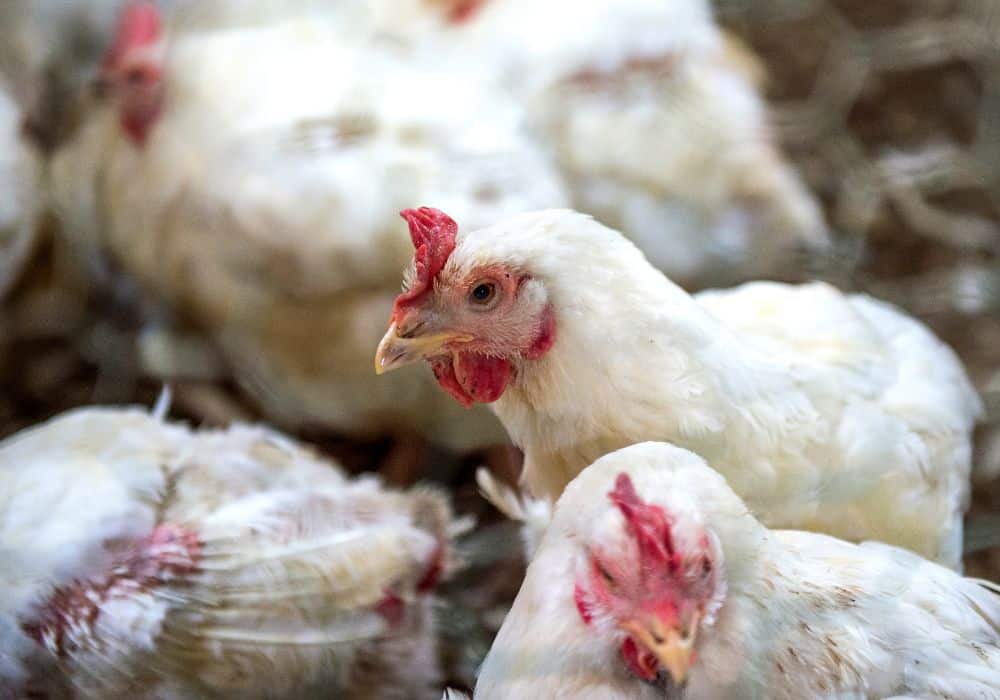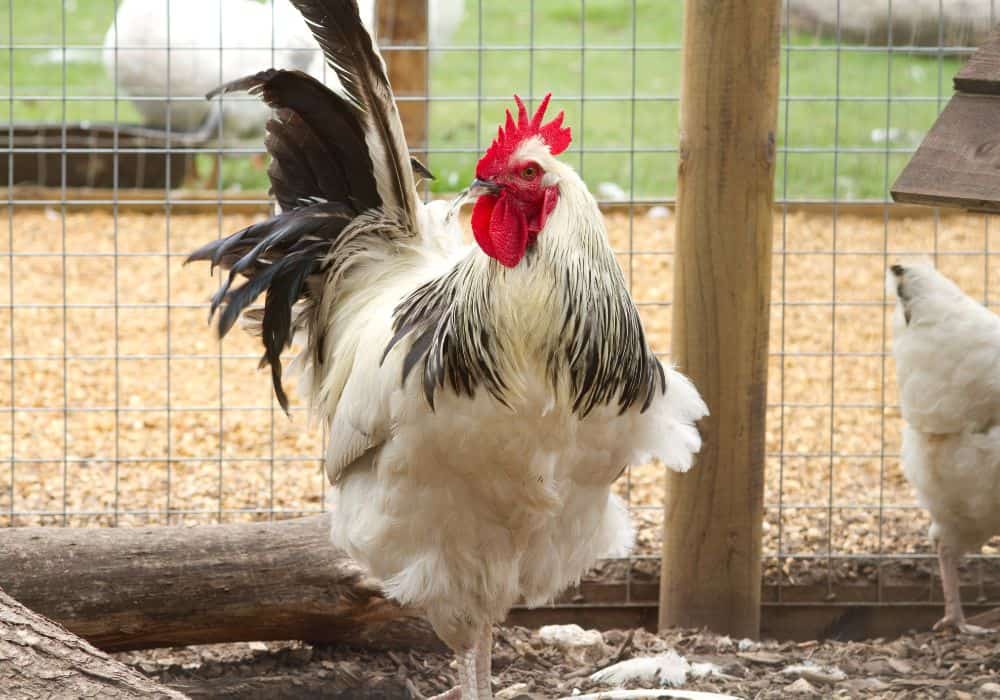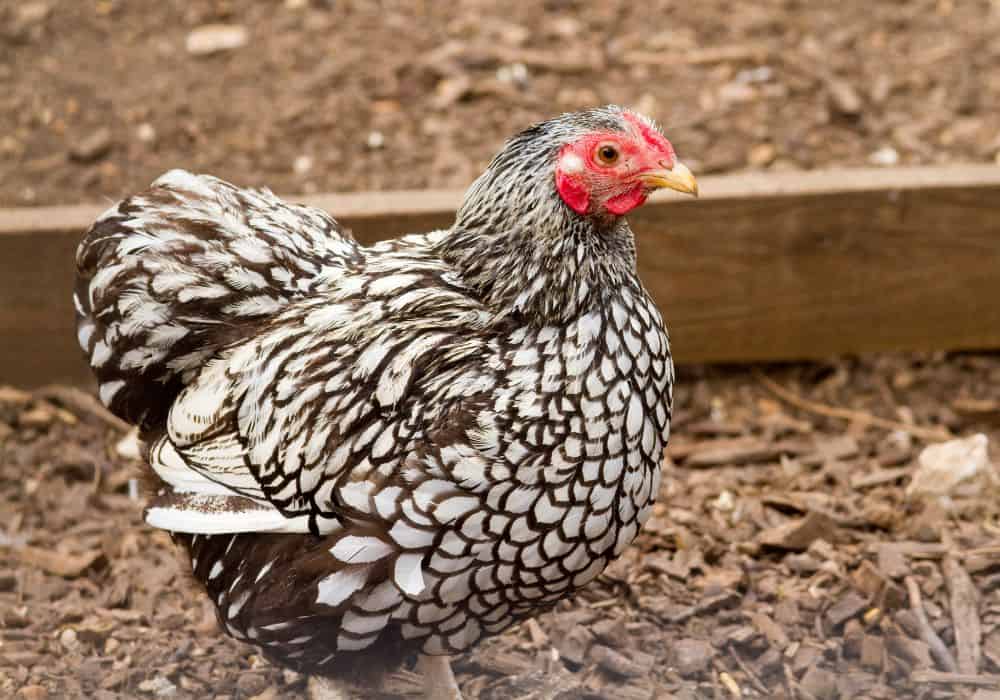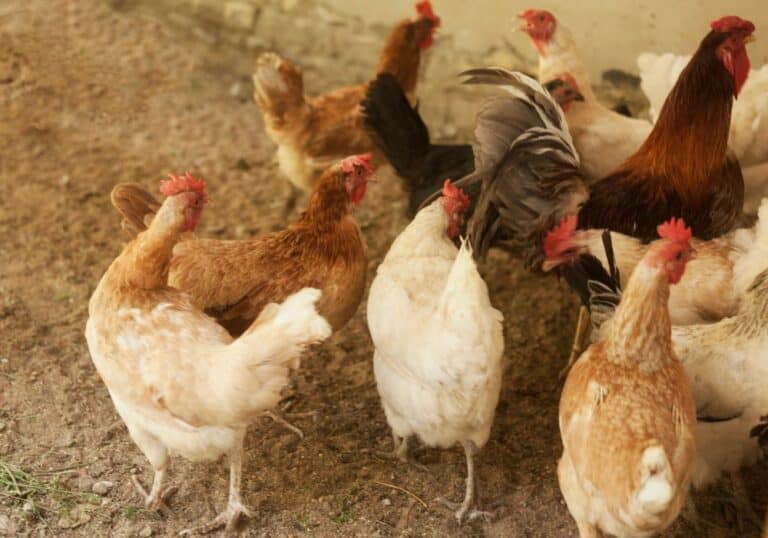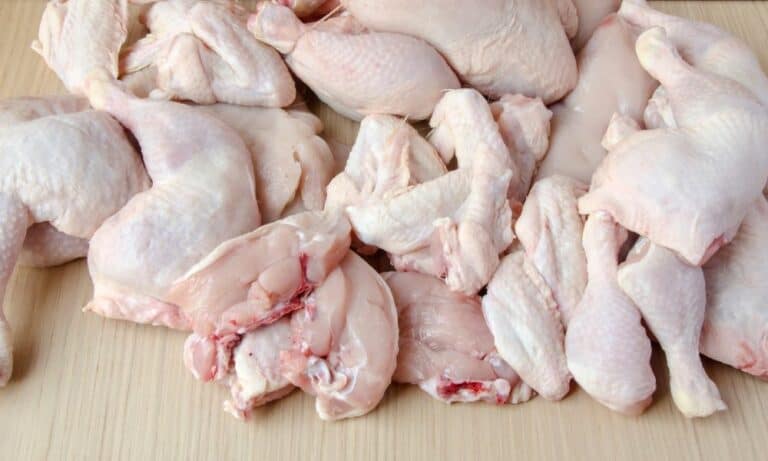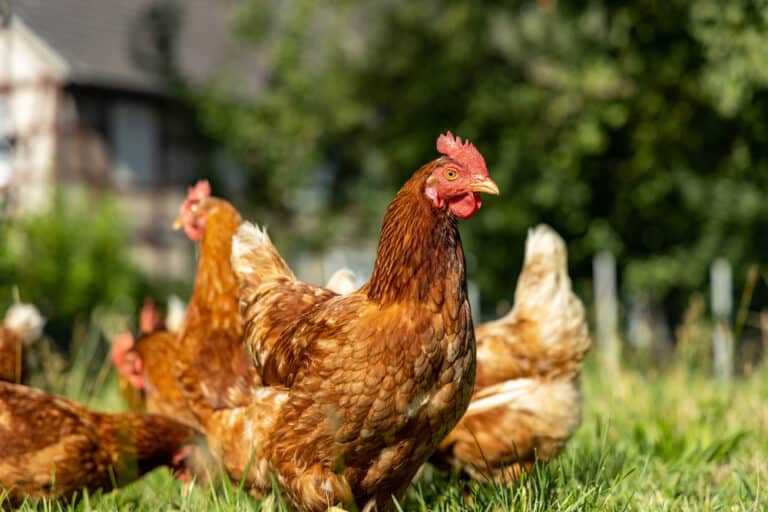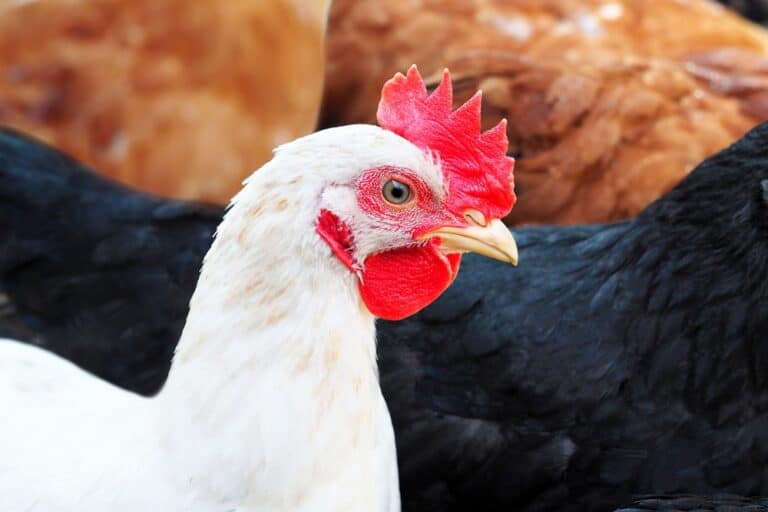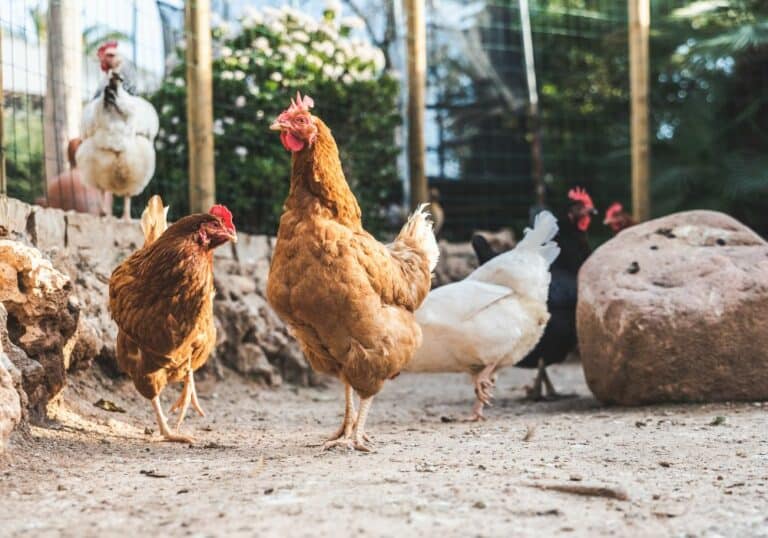Do you have a hen that is not laying eggs? Perhaps she has lost her appetite or you have noticed she is walking funny or has abdominal straining. This could be because she has become egg-bound, meaning she has an egg stuck inside her reproductive system.
While that may sound alarming, there are things you can do to help your hen to pass the stuck egg. If you suspect that one of your hens is egg-bound, it is important to investigate it quickly or it could be dangerous. Continue reading to find out what to do in case of an egg-bound chicken and how to prevent egg binding in your hens.
What is an Egg Bound Chicken?
An egg-bound chicken is a hen with an egg stuck in her reproductive system, more specifically in the final part of the reproductive tract. Instead of passing the egg as she would normally do, the hen cannot pass it through her cloaca.
When everything is working correctly, the egg should travel with the pointy end first to the uterus or shell gland. When the shell has formed, the egg should turn around so the blunt end is traveling first through the oviduct. Often, this is when the trouble starts when the egg cannot turn completely.
If a hen cannot pass an egg, it also means she cannot poop. When a hen is about to lay an egg, the cloaca closes the intestines opening to stop feces from contaminating the egg. This opening will remain closed until the egg is released, making the chicken constipated. In chickens, this can kill them in just 48 hours.
How to Identify an Egg-Bound Hen?
It can be challenging to identify hens that are egg-bound before it is already too late. Many of the symptoms of egg binding will be easy to confuse as symptoms of other chicken diseases. Sometimes you might not even realize that a hen has been egg-bound if it eventually passes the egg on its own.
However, some symptoms may alert you to egg binding. You might notice that your chicken is not eating or drinking as much as before. The hen could also be wheezing, panting, or lethargic. She might also appear unsteady on her legs or squat frequently to try to push the egg out.
Some chicken keepers have also noticed that an egg-bound hen seems depressed and has shaky wings and a strained abdomen. She might move her tail up and down vigorously to get the egg moving.
You can also check their feces or notice a lack of feces. When the vent is sealed, the chicken cannot pass any solid poop. However, they will sometimes pass small amounts of bad-smelling liquid almost as if she had diarrhea.
Why Do Chickens Become Egg Bound?
There are several causes of egg binding in chickens. If you can identify the cause, then you may be able to prevent egg binding in your hens.
Not Enough Calcium
Hens need a lot of calcium when laying eggs. Not only do they need it to maintain strong bones but they also need it to form the eggshell. In addition, calcium helps the muscles used in passing the egg to contract and push out the egg. When a hen has a calcium deficiency, the muscles lack the energy they need to contract to push the egg out, leading it to become stuck.
Hen Obesity
If your hens are obese, they could have a difficult time passing an egg. In obese chickens, the muscles are weaker and will not contract as much as needed to expel the egg.
An Infection in The Reproductive Tract
When a hen has an infection in her reproductive tract, this can cause egg binding. You might not notice any symptoms from the infection but it can weaken the muscles among other problems.
Egg Retention
Your hen may be deliberately holding on to the egg, which will damage the muscles used to pass the egg and this can make her egg bound. A hen might do this, for example, if there is no nesting box available for her.
Other Causes
There are a few more causes that can lead to a hen becoming egg-bound. These include malformed eggs, stress, and parasites such as worms. Premature laying, which means a pullet started egg laying before it was ready, can also lead to problems with egg binding. In some breeds, it can also be a genetic issue.
What to do if You Suspect Egg Binding?
If you think you may have an egg-bound hen, you first need to determine if that is definitely the case. You need to ensure you are treating the correct cause so your hen gets the help she needs as quickly as possible.
While you can take the hen to a veterinarian, you can also perform a quick check-up yourself. You will need a latex glove and some Vaseline for lubrication. This will prevent damage to the hen’s vent. Hold the hen firmly under one arm and with your index finger, gently feel inside her vent.
If there is a stuck egg, you should be able to feel it within two inches from the opening. If you cannot feel the egg, then her symptoms are caused by something else. If there is an egg, follow the steps below to help her.
Give the Hen a Warm Bath
Once you have checked that your hen is egg-bound, the first part of the treatment is to give her a warm bath. Mix 1/2 cup of Epsom salts per 1/2 gallon of warm water. This can help to loosen the egg.
When you place the hen in the water, she may struggle at first. However, she should calm down as the water soothes the sore vent area. After twenty minutes, dry her off thoroughly. Using some lubricating gel, massage the vent area lightly for a couple of minutes. This will encourage the oviduct to contract.
After the massage, place the hen in a quiet and dark area apart from the rest of the flock. This will help her stay calm and hopefully, she will pass the egg. Check on her every hour and repeat the bath and massage two or three times. If the bath treatment is not doing the trick, it is time to try other methods or call the vet.
Give Your Hen Sugar Water
After the bath, give your hen a sugar water solution. She may suffer from a loss of appetite because of the stuck egg and lacking nutrients will only make the issue worse. Some sugar water will help to replace some nutrients she has lost and will also lubricate the egg internally so it is easier to pass.
Wrap the Hen in a Warm Towel
If your hen will not calm down after a few minutes of you putting her in the bath, it is best not to cause her any more distress. Instead, you can wrap her in a warm moist towel. Put the hen in a darkened, confined space and the warm moist towel may help to loosen the stuck egg.
How to Remove a Stuck Egg
If the hen has not passed the egg after several baths, it is time to remove the egg. You can do this yourself or you may prefer to take her to a vet because if the removal goes wrong, it could be dangerous, even fatal, for the hen.
If you are doing it yourself, you need to pierce a hole into the stuck egg with a needle and use a syringe to extract its contents. Once that is done, pull the shell out slowly to avoid breaking the egg inside the hen.
Should the egg break, you need to ensure you get all the pieces out or they may lead to an infection. Furthermore, the shards of the eggshell are sharp enough to cut her oviduct. If the egg breaks during the removal process, the hen will need antibiotics to prevent infection.
Let the Hen Rest
Alternatively, if you prefer not to risk the egg breaking as you pull it out, let the hen rest after you have emptied the egg with the syringe. It can now come out easier as it is not a solid mass anymore. During this time keep her in solitude and the darkened space.
It will likely take the hen a few days to get the egg out and you should watch her carefully over the next few days until and after the egg has come out. Ensure she is eating, drinking, and behaving normally. Examine her for swelling or vent prolapse and only return her to the flock when she has fully recovered.
Preventing Egg-Binding
While it may not always be possible to prevent egg-binding, especially in breeds where it is a genetic issue, you can try to ensure it happens as little as possible.
Feed Your Hens Right
Your laying hens need a diet that is rich in calcium and other vitamins and nutrients they need to be healthy and produce healthy eggs. You can buy ready mixed layer feed for them, which has been specially prepared to meet the needs of egg-laying hens.
You also need to watch your hens’ diet so they are not getting overweight since that can cause problems with egg laying. Some breeds are especially prone to eating too much so you might need to ration their food.
Check Your Chickens for Worms
If your hens have worms, this can not only affect their egg-laying ability but also cause other health issues. If you think they might have worms, take a sample of their poop to a vet for a test. You can then treat them accordingly. Some people choose to treat their hens regularly for worms to avoid problems.
Have Enough Nesting Boxes
Since the lack of space for egg laying can lead to egg retention, you need to make sure you have enough nesting boxes for your flock. How many you will need depends on your breed but generally, one box between three chickens is enough.
Create a Stress-Free Chicken Coop
Your hens are creatures of habit and any changes to their routing are likely to cause them stress, this includes introducing new members to a flock or putting them in a new coop. You should always implement changes at a slow pace to give them a chance to get used to anything new gradually.
Prevent Premature Egg Laying
Chickens use light in their egg production and extra light in a coop or outside during the long summer days can get your hens laying before they are ready. Therefore, you should monitor how much light your pullets get to prevent them from laying eggs before their bodies are fully developed.
Watch Out for Infections
Since infections can lead to egg-binding, you need to monitor your flock for any signs of problems with their health. Keeping your chicken coop clean and giving your chickens the nutrients they need can help to if not eliminate, at least reduce infections among your chickens.
Make Your Chickens Feel Safe
If your hens are becoming egg-bound more often, it could be that something in their living environment is making them nervous. This could be a predator that is stalking your chicken coop. To make your chickens feel more relaxed, ensure the coop is fully protected from predators.
Avoid Treats During Warm Weather
You should always regulate the number of treats you give your chickens, especially during hot weather. When the temperature rises, your chickens are likely to eat less of their feed and this may lead to malnutrition and an imbalance of minerals, vitamins, and electrolytes in the hens.
Summary
While you can take measures to prevent egg binding in your hens, it is likely to happen at some point. Sometimes the hen will naturally pass the egg, other times she may need some help. Try bathing her to help her relax and as a last resort try to get the egg out or call a vet.
Hopefully, this article has helped you better understand what to do in egg-binding cases. If there is anything you would like to ask about it, write your questions in the comments section.

